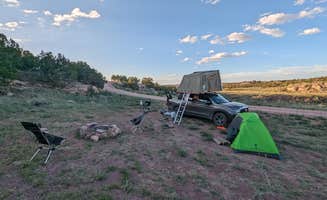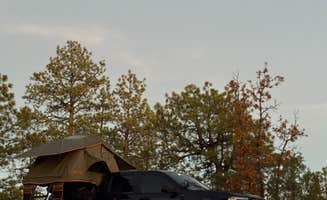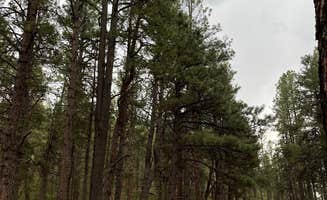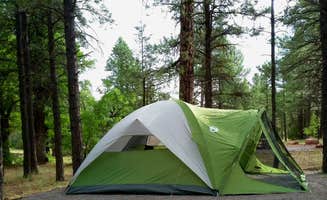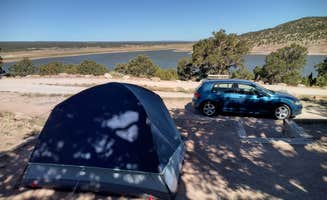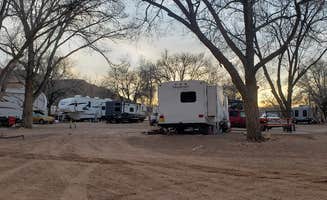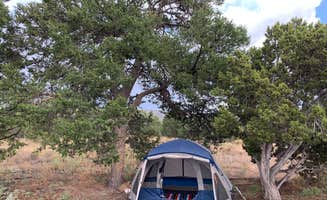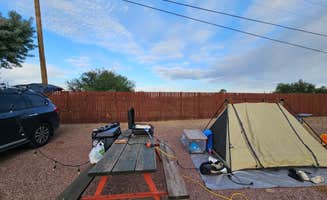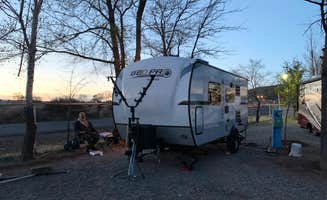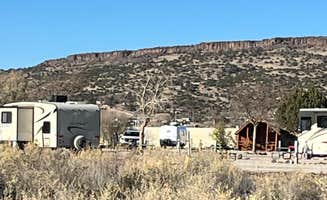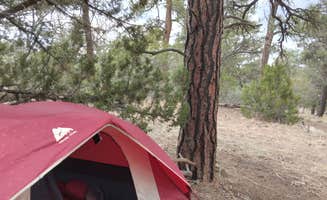Dispersed camping locations near Continental Divide, New Mexico range in elevation from 7,000 to 8,000 feet, offering cooler temperatures than surrounding lowlands. Seasonal access varies significantly across the region, with many forest roads closing between December 15 and March 31. Winter overnight temperatures frequently drop below freezing, with summer daytime highs typically in the 70s and 80s.
What to do
Hiking the trails: Several campgrounds provide direct access to hiking paths through pine forests and volcanic terrain. At Turkey Springs, visitors appreciate the natural surroundings and varied terrain. "Just off & along the interstate, you'd never know. The valley road cuts through green canyon bluffs and rolling hills with good tree coverage. Lots of fun and scenic driving. Spur trails are good 4x4 drives," notes Twan M.
Explore volcanic features: Within a 30-mile radius of many camping areas, visitors can access unique geological formations. When staying at El Morro National Monument, campers can examine ancient petroglyphs and a historic water pool. "El Morro National Monument features some amazing petroglyphs and the remains of a pueblo, offering fun hikes," says Jean C., who visited in winter when "it was cold and largely unoccupied."
Wildlife observation: The forested areas provide opportunities to spot native animals during early morning or evening hours. "We saw abundant wildlife while working in the Zunis, including several brown bears, deer, and elk," reports Tyler G. from Quaking Aspen Campground. Morning hours typically offer the best wildlife viewing opportunities, particularly in less-trafficked areas of the forest.
What campers like
Privacy at established sites: Many campgrounds offer well-spaced sites despite their proximity to Interstate 40. At Quaking Aspen Campground, campers find generous spacing. "Small campground with massive campsites. This campground could easily squeeze double, if not triple, the sites out of these woods, but someone decided to let everyone breath a little here," Chip observes, also noting "when summer heat was beginning to knock everywhere else in late May, it was serious blanket weather up here."
Accessibility without crowds: Even near major travel routes, many camping areas remain relatively undiscovered. When staying at Six Mile Canyon Road Dispersed Site, Terry O. reports: "Went about 2 miles up the road to find the last good spot. Found a few sites off of the road before this but all occupied. We got a site for 2 RVs that protected us from an impending windstorm."
Temperature variations: The higher elevations provide relief from summer heat common in lower-lying areas. According to Charles V., the "elevation at which the [Quaking Aspen] cg is at is 8000' makes for cool days and nic crisp cool nights, even in the summertime." This elevation differential can result in temperature differences of 15-20 degrees compared to nearby Gallup.
What you should know
Seasonal closures: Many forest roads and camping areas implement winter closures. For Turkey Springs, Dave B. warns: "This site is closed from December 15 to March 31." Similar restrictions apply at other dispersed sites in the region, with closures typically occurring after the first significant snowfall.
Road conditions: Access roads to many dispersed sites require careful navigation, particularly after rain. At Six Mile Canyon - Dispersed Camping, Jennifer C. notes: "The road in is dirt and gravel and could easily get rutted out when rainy. There are several spots along the road the first being right after the cattle guard after the sign. There are more spots farther in when you get to the trees."
Water availability: Most dispersed camping areas have no potable water sources. Robert B. points out at Quaking Aspen Campground: "There are clean pit toilets, picnic tables and fire rings. Really nice hiking / mountain bike trails. The aspens are in the trails not the campground." Campers should bring sufficient water supplies, particularly during warmer months.
Campfire regulations: Fire restrictions vary seasonally, with complete bans common during dry periods. Pack a camp stove as a backup cooking method, as restrictions can change with little notice during peak fire season from May through August.
Tips for camping with families
Accessible activities: Several locations offer family-friendly amenities and exploration opportunities. At Bluewater Lake State Park Campground, Sara S. found "Great state run campground with options from primitive to full hook ups at great prices. The primitive camping is all along the lake so you can park and walk right in with your canoe or SUP. Playground for the kiddos, lots of areas to explore with the puppers."
Wildlife encounters: Local wildlife adds educational value but requires proper precautions. Tyler G. recommends that while camping in the Zuni Mountains, visitors should "be aware that large animals are present in the area and be sure to take necessary bear-proofing precautions," based on frequent sightings of "brown bears, deer, and elk."
Weather preparedness: Pack for significant day-to-night temperature variations, even in summer. Irene L. from Quaking Aspen Campground advises: "It was cool and shady in August so we quite enjoyed it as a stopover," highlighting the area's reputation for comfortable summer temperatures compared to lower elevations.
Tips from RVers
Site selection: RVers should research access road conditions carefully before attempting dispersed camping. Gordy Y. shares about Six Mile Canyon: "I drove my Prius in during the summer and it was fine. Granted, I could see how this would be hazardous if the ground was soft and muddy." However, larger rigs may require more established locations.
Hookup availability: For those requiring facilities, several developed campgrounds offer various service levels. At USA RV Park in Gallup, Susan R. notes: "Our site was mostly level so we used our small curved levelers on one side. The sites are VERY close together and many of the picnic tables seem to need new boards for seats." The park provides full hookups but offers limited privacy.
Leveling challenges: Many campgrounds in the region have uneven terrain. Timothy N. observed at Turkey Springs: "Several sites off the smaller two track roads can support good size trailers with lots of flat open space. A few sites in the trees right on the road could only support vans or tents." Bring leveling blocks as most dispersed and many established sites require adjustments.


